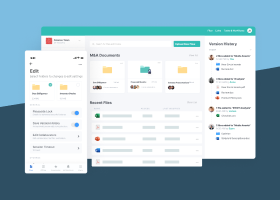The Importance of Financial Data Management
What Is Data Sharing in Finance?
Financial data sharing is the access, standardization, and transport of customer information between related parties with consumers’ explicit permission. An example of financial data sharing includes services that connect to bank accounts, credit cards, or other financial accounts to support many functions. Among the many use cases for financial data sharing include the following.
- Applying for a loan
- Buying or renting a home
- Evaluating financial products
- Financial advice services
- Improving your credit profile
- Requesting an insurance quote
- Saving and investing money
- Sending or receiving money
- Tools to help consumers with budgeting
- Verifying identity

These are common use cases where financial data sharing is conducted as an important part of modern society. However, financial data sharing has serious implications for the security and privacy of individuals’ personal and sensitive information. Financial data sharing is a serious issue for both individuals and organizations engaging with it. Financial data sharing tools provide organizations with more and more opportunities to gain consumers’ consent, which often stretches far beyond what the consumer expected.
Financial data sharing ranges in its scope. Some organizations only use shared data once (e.g., to verify identity, get information when a new account is set up, or for a loan application). However, many services use shared data on an ongoing basis. For example, if someone signs up for an app that helps them manage their budget, they will often be asked to provide it with access to bank accounts and credit cards to combine and analyze data. This is a helpful service but exposes vast amounts of personal and sensitive information.
| Data Sharing in Finance and Open Banking Open Banking is a government and regulator-led concept that mandates banks share consumer data in a machine-readable way so consumers can access and safely transfer their banking data to trusted parties. The goal is to reduce the friction of changing financial service providers. |
What to Consider When Sharing Financial Data
Considerations when sharing financial data are mostly focused on consumers, but it behooves organizations involved in financial data sharing to understand their concerns. Below are recommendations commonly shared with consumers regarding financial data sharing.
| Considerations for Financial Data Sharing at a Glance Make sure to understand if: The data you share may be shared with third parties, and how often the service will access your accounts. The data you want to share is being shared. The service will have the ability to make payments or move money between your accounts. You are comfortable with how your data is being used. You can check your information for accuracy. You can dispute any errors you see in the data. You can instruct the service to stop accessing your accounts and how to delete the data you have shared. You can view and change what data the service is accessing and storing as well as for how long. You have legal rights regarding disputes. |
Assess the reputability of the organization
Consider the reputation of the organization that will be engaging in financial data sharing with your information (e.g., bank, app, or financial service provider) before sharing your data. Only allow financial data sharing with organizations that have a solid reputation. This can be checked through the FDIC and other reports. In addition, look for reviews on third-party websites, app stores, and other media to learn about real customer experiences.
Find out what information will be shared and why
There are a number of cases where organizations may engage in financial data sharing with other organizations, including third-party technology service providers, to deliver a better customer experience, expedite data sharing, and enhance security. This is perfectly acceptable, but organizations should be clear about where personal information is shared.
Learn why financial data sharing is required
Financial apps, lenders, and other services should disclose the reason why financial data sharing is needed. It should be limited to the uses specifically tied to why you will be engaging with them. In some cases, such as budgeting apps or financial planning services, ongoing access may be required. For others, it should be only one-time access, such as a loan application.
Understand what data security measures are in place
For organizations that engage in financial data sharing, some of the measures they should have in place in order to protect sensitive data are the following.
- Encryption
Organizations should use end-to-end encryption to shield and encode sensitive data where it is stored and when it is transmitted. - Multi-factor authentication
Organizations should use at least two-factor authentication, ideally multi-factor authentication, to add a layer of identity verification before logging into accounts to prevent unauthorized account access. - Latest versions of apps and software
Organizations should require the use of the latest versions of their apps or software to ensure that updates and security enhancements are used to protect accounts. - Secure connection
Organizations should require the use of only their secure websites and official apps when accessing accounts or transmitting sensitive information.
Financial Data Sharing Security Best Practices
Additional actions to consider with regard to financial data sharing are security precautions, including the following.
- Always review bank and other statements for unauthorized transactions.
- Cancel authorization to access personal data when no longer using a service.
- Monitor which services are accessing personal data.
- Report unauthorized or suspicious transactions to financial institutions.
- Take action in response to a data breach notification.
- Turn off apps and services when they are not in use.
- Use a separate, strong password for each financial account.
Redefining Data Sharing for Financial Services
Commonly cited objectives of redefining financial data sharing are:
- Enforce effective data access controls for security and privacy requirements
- Give consumers ready access to their data
- Provide access to the most recent data
- Reduce the friction of changing financial service providers
- Simplify financial data sharing across connected ecosystems
Achieving Redefined Financial Data Sharing
The concept of redefining financial data sharing is multi-faceted. Open Banking is at the heart of redefining financial data sharing. This government and regulator-led concept mandates that banks share consumers’ financial data in a machine-readable that is easy for consumers to access and safe to share with trusted parties. Following are several ways that this is facilitated by adopting standards and frameworks, such as the European Central Bank’s Banks’ Integrated Reporting Dictionary (BIRD) and the Financial Information eXchange (FIX).
Benefits of Financial Data Sharing
For financial institutions, there are many benefits attributed to financial data sharing, including the following.
- Boosts productivity.
- Encourages more connection and collaboration.
- Facilitates decision-making.
- Improves data quality.
- Streamlines operations.
To get the most out of financial data sharing, it is necessary to have a plan with objectives, measure performance, and implement and enforce appropriate security measures.
Egnyte has experts ready to answer your questions. For more than a decade, Egnyte has helped more than 22,000 customers with millions of customers worldwide.
Last Updated: 13th January, 2024



